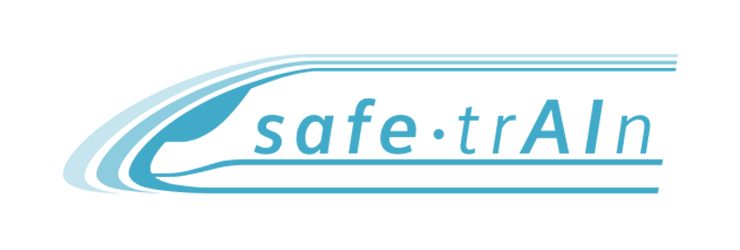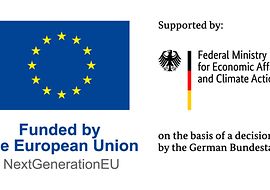Safe.trAIn
Safe AI using the example of driverless regional trains

The project aimed to increase the attractiveness of rail passenger transport with the help of digitalization and automation of the existing rail network, e.g., by increasing flexibility for passengers with shorter intervals and connections at off-peak periods to enable higher capacity utilization of trains in a cost-effective manner. Within the framework of safe.trAIn, a consortium of rail industry, technology suppliers, research institutions, and standardization and testing organizations were working together with their complementary social and technical expertise to realize those visionary goals.
A major challenge was the practicable linking of AI processes with the requirements and approval procedures in the rail sector. One focus was on the development of standardized test methods and tools, in order to ensure approval-relevant product safety for the broad use of fully autonomous trains. In addition, the safety architecture was concretized using the example of the driverless regional train, and a fully automated GoA4 system for this use case was conceptually developed and validated in a virtual test field. Standards and specifications play a critical role in accelerating time-to-market access and the safe, robust, and trustworthy application of AI-based methods for driverless train traffic.
DIN managed the work package Standardization and dissemination. The main goal was to transfer the relevant project results into standardization thus ensuring the utilization and a sustainable dissemination of the project results beyond the end of the project.
DIN first informed about the relevant existing standards and specifications, in order to jointly identify possible standardization potentials with the project partners in the next step and to finally transfer them into standardization projects. Relevant standardization approaches were also introduced into European and international Standardization via corresponding standardization committees. A Guest access to the DIN/DKE joint AI committee has been installed so that the latest findings from standardization in the field of AI can be connected to safe.trAIn and help with the determination and development of standards.
The safe.trAIn project was the first official lighthouse project of the AI standardization roadmap. The Lighthouse projects are of particular importance in the implementation of the German AI standardization roadmap, which is why they enjoy increased attention from the stakeholders of standardization.
Standardization roadmap Artificial Intelligence
Project results
The following standardization documents were developed within the project:
DIN DKE SPEC 99002:2025-03 - Terminology - AI in railway applications; Text in English
This document defines terms in the cross-cutting topics of artificial intelligence (AI) and railways with the aim of improving common understanding for AI applications in railways.
DIN DKE SPEC 99004:2025-05 - Specification of Operational Design Domain in Rail; Text in English
This document defines a taxonomy for the Operational Design Domain (ODD) for fully automated rail vehicles (automated driving systems in rail), which is also based on the description of other domains (e.g. automotive). This SPEC shows the extent to which common concepts or parts of the taxonomy description can be modularized or made reusable.
Next steps for the DIN DKE SPECs:
Both DIN DKE SPECs are also to be communicated at European level. To this end, the relevant committees at DIN (DIN Standards Committee Railway (FSF)) and DKE (DKE/K 351) have been contacted and the presentation of the SPECs to the European committee (CLC/TC 9X Electrical and electronic applications for railways) is planned.
Project duration
01/2022 - 09/2024, extended until 03/2025
Project coordinator
Siemens AG (Koordinator)
Siemens Mobility GmbH (technischer Koordinator)
Project partners
- BIT Technology Solutions GmbH
- Bridgefield GmbH
- Edge Case Research GmbH
- ITQ GmbH
- Merantix Labs GmbH
- SETLabs Research GmbH
- Verband der TÜV e. V.
- Fraunhofer IKS
- Hochschule Düsseldorf
- Otto-von-Guericke-Universität Magdeburg
- Verband der Elektrotechnik Elektronik Informationstechnik e. V.
- Bundesamt für Sicherheit in der Informationstechnik (assoziiert)
- Deutsches Institut für Normung e. V.
For further information see https://safetrain-projekt.de
Project funding
The project is funded by the European Union and the German Federal Ministry for Economic Affairs and Climate Action as part of the programme „New vehicle and system technologies“. Funding code: 19I21039O

